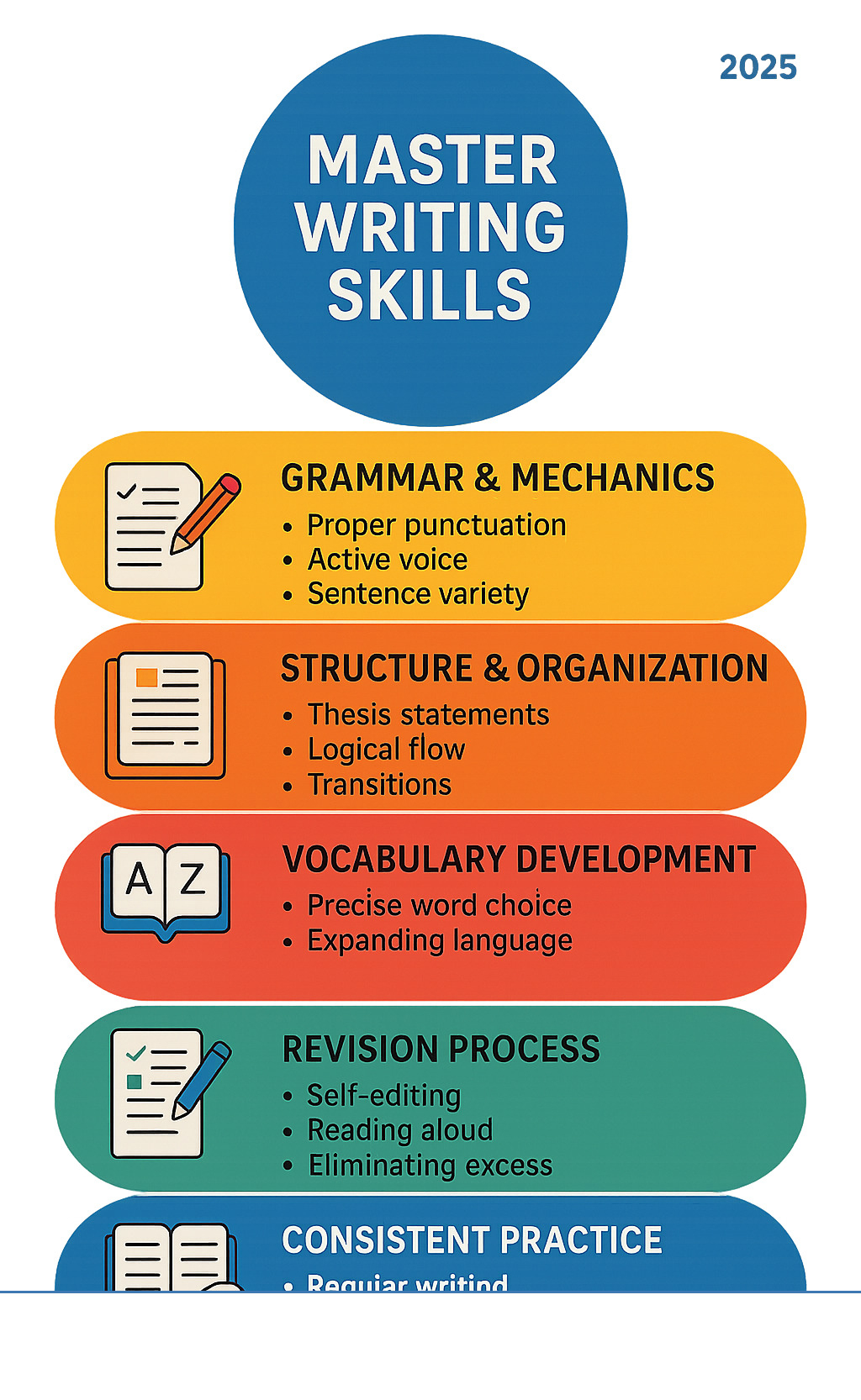
Why Writing Skills Are Essential for Your Child’s Success
To master writing skills, students need to focus on five key areas: grammar and mechanics, clear structure and organization, vocabulary development, the revision process, and consistent practice. These foundational elements work together to build confident, effective writers who can express their ideas clearly across all subjects.
Quick Guide to Master Writing Skills:
- Grammar & Mechanics – Active voice, proper punctuation, sentence variety
- Structure & Organization – Strong thesis statements, logical flow, smooth transitions
- Vocabulary Development – Precise word choice, avoiding repetition, expanding language
- Revision Process – Self-editing, reading aloud, eliminating unnecessary words
- Consistent Practice – Regular writing, journaling, low-stakes exercises
If your child avoids writing assignments or struggles with essays, you’re not alone. Many students across Massachusetts find writing challenging, but the good news is that strong writing skills can be developed with the right approach and support.
Writing isn’t just for English class. Strong writing skills boost confidence and performance across all subjects, from science reports to history essays. They also lead to better scores on tests like the SAT, ACT, and MCAS, more compelling college application essays, and essential skills for future career success.
The journey to becoming a skilled writer takes time, but every child can improve with consistent practice and guidance on the fundamentals.
I’m Peter Panopoulos, and as a former middle school teacher with over 8 years of classroom experience, I’ve seen how personalized instruction helps students master writing skills and build lasting confidence. Through A Traveling Teacher, our team of licensed educators provides one-on-one online tutoring that meets students exactly where they are in their writing journey.

Why Strong Writing Skills are a Superpower for Students
Effective writing is a superpower for students, a crucial skill that transcends all academic subjects and future career paths. It involves mastering elements like grammar, structure, and clarity to communicate ideas persuasively.
The Foundation: What Are Writing Skills?
To master writing skills, several foundational elements come into play:
- Grammar: The rules of a language that ensure sentences are clear and correct.
- Spelling: Essential for credibility and readability.
- Punctuation: Guides the reader, creating clarity and flow.
- Sentence Structure: Using a mix of long and short sentences to make writing more engaging.
- Vocabulary: Choosing precise words to make writing more impactful.
- Clarity: Expressing ideas simply and directly, so the message is easily understood.
- Persuasion: Presenting effective arguments to convince the reader.
- Organization: Arranging ideas logically so the text flows smoothly.
- Research and Accuracy: Gathering and presenting correct information, especially for academic work.
These elements form the backbone of strong writing. Mastering them takes time, but the effort pays off in a student’s academic performance and future opportunities.
Ready to Unlock Your Inner Wordsmith?
Schedule a call with Peter today to discuss your child’s needs when it comes to writing.

The Impact: Building Confidence Beyond the Classroom
The benefits of strong writing skills extend far beyond grades. They build a foundation for critical thinking and self-expression that empowers students in all facets of life.
- Effective Communication: Writing well is a crucial job skill. According to the National Association of Colleges and Employers, employers consistently rank written communication skills as one of the most desired attributes in new hires.
- Critical Thinking: Writing essays and reports requires students to analyze information, synthesize ideas, and build logical arguments, which sharpens critical thinking.
- Academic Confidence: When students write well, their confidence grows in all subjects, leading to better study habits.
- Essay Writing: Mastering essay structure is essential for success in all academic writing.
- Test Preparation: Writing is a key component of standardized tests like the SAT, ACT, PSAT, MCAS, ISEE, and SSAT. Strong skills can significantly improve scores.
- College Applications: A strong command of language is needed to write compelling college and scholarship application essays.
- Future Career Success: Clear and persuasive writing—from emails to reports—is vital for success in any career.
- Self-expression and Personal Growth: Writing is a powerful outlet for self-expression, fostering personal growth and self-awareness.
We offer comprehensive support across a wide range of subjects, ensuring your child receives the targeted help they need to excel. You can find more information about our tutoring subjects here: More info about our tutoring subjects.
The Building Blocks: Key Elements of Great Writing
Think of great writing like building a house. You need a solid foundation, strong walls, and beautiful finishing touches. When your child understands these core components, they’ll be ready to tackle any writing assignment with confidence.
The three pillars that help students master writing skills are mechanics (the foundation), structure (the framework), and style (the finishing touches). Let’s explore each one.
Mastering the Mechanics: Grammar, Spelling, and Punctuation
Solid mechanics are essential for clear communication. Without them, even brilliant ideas can get lost.
Active voice makes writing more direct and engaging. As a general rule, clear, concise writing uses the active voice whenever possible, a principle supported by many university writing guides. For example, “Cinderella cleaned the house” is stronger than “The house was cleaned by Cinderella.”
With practice, students can avoid common grammar mistakes like subject-verb agreement and pronoun confusion.
Punctuation rules act like traffic signals for readers. Proper use of commas, semicolons, and other marks guides readers through sentences and prevents confusion.
Sentence variety keeps readers engaged. Mixing short and long sentences prevents monotony. Reading work aloud helps identify awkward phrasing and repetition.
Proofreading is about improvement, not perfection. While spell-check tools help, they can’t replace a careful human review.
As a parent, you can help by encouraging your child to read their work aloud to catch errors. When reviewing homework, be a supportive partner. Ask, “How does that sound to you?” instead of just pointing out mistakes.
Creating a Solid Structure
A well-structured piece of writing guides readers smoothly from one idea to the next. For academic writing, structure is essential.
Outlining ideas before writing prevents writer’s block and ensures all key points are covered.
Thesis statements are the heart of an essay. This single sentence, usually at the end of the introduction, presents the main argument.
Writing a hook—a surprising fact, question, or anecdote—grabs the reader’s attention from the first sentence.
Introductory paragraphs should act like a funnel, starting broad and narrowing to the specific thesis statement.
Body paragraphs should each focus on one main idea that supports the thesis.
Smooth transitions are bridges between paragraphs that connect ideas and ensure the writing flows smoothly.
Writing a conclusion should restate the thesis, summarize the main points, and leave the reader with a lasting impression.
Developing a Clear and Compelling Style
Beyond grammar and structure lies style—what makes your child’s writing uniquely theirs.
Show, don’t tell brings writing to life. Instead of telling the reader something (“She was sad”), show them with descriptive details (“Tears traced silent paths down her cheeks”).
Using strong verbs energizes writing. “Sprinted” creates a more vivid image than “ran.”
Expanding vocabulary happens through reading, but always prioritize clarity over complexity. Use words you understand.
Avoiding repetition makes writing more concise. Good editing often means cutting redundant words and phrases.
Conciseness is key. Clarity and brevity are more impressive than overly complex sentences.
Finding a unique voice means letting personality shine on the page. Encourage your child to write to express their own ideas, not to impress others.

A Practical Guide to Help Your Child Master Writing Skills
Here are actionable strategies parents in Massachusetts and beyond can use to support their child’s journey to becoming a better writer.
Encourage a Love of Reading
The link between reading and writing is undeniable. Avid readers naturally absorb good writing patterns, vocabulary, and storytelling techniques.
Encourage reading widely across genres. Fiction teaches narrative flow, while non-fiction demonstrates how to build arguments.
Discussing books helps your child become an analytical reader. Ask questions like, “How did the author grab your attention?” to help them recognize effective techniques they can use in their own work.
Help them make connections between reading and writing by noticing how their favorite authors use dialogue, build suspense, or present evidence.
The Power of Practice: How to Help Your Child Master Writing Skills

Writing is a skill that improves with practice. The key is making it feel natural and enjoyable.
Building a writing habit is about consistency, not perfection. Just 15-20 minutes of regular practice can make a huge difference.
Journaling is a great low-pressure way to help children master writing skills. It helps develop voice and organization without the fear of grades.
Low-stakes practice gives kids permission to experiment and make mistakes. The goal is simply to get ideas on paper.
To overcome fear of the blank page, encourage your child to just start writing anything. The act of starting is what matters.
Fostering a growth mindset means celebrating progress over perfection. Acknowledge small improvements to build momentum and confidence.
Celebrating effort, not just perfection builds the confidence struggling writers need. Start feedback with what they did well before suggesting improvements.
The Art of Revision: A Key Step to Improve Writing
Professional writers often spend more time revising than drafting. Teaching your child that revision is a normal, expected part of the process is crucial.
Taking a break before editing provides fresh perspective. Encourage them to step away for a few hours, then return to spot issues they missed before.
Reading work aloud is a powerful revision tool. It helps catch awkward sentences, repetition, and places where the flow feels off.
A self-editing checklist can make revision less overwhelming. Students can focus on one area at a time, like organization, then grammar.
Peer feedback from family or friends teaches students how to give and receive constructive criticism.
Focus on big-picture issues first during revision—like clarity and organization—before moving on to polishing grammar and word choice.
Eliminating unnecessary words transforms good writing into great writing. Shorter, clearer sentences are often more impactful.
Build Confidence Today
As a group of licensed teachers, we know what works.
Schedule your Free 15-Minute Consultation today
Using Technology as a Tool
Technology can be helpful, but it works best when used thoughtfully.
Grammar checkers and thesaurus tools are helpful but not perfect. Teach your child to use them as a starting point and to think critically about the suggestions.
Understand when and how to use them. These tools are best for final editing stages. They can catch typos but can’t fix bigger issues like weak arguments.
Remember their limitations: technology can’t understand context or persuasion. It should support a writer’s thinking, not replace it.
Foster independent thinking by encouraging your child to understand why a correction is needed, not just accepting it blindly.
In our online tutoring sessions, we use interactive tools like digital whiteboards and shared documents for a collaborative revision process. Students get real-time feedback and immediate support to practice their editing skills. Learn how our expert teachers can help your child become a confident, capable writer.
When to Seek Extra Support for Writing
Despite your best efforts, some children need extra help to master writing skills. Recognizing this is a sign of great parenting. If your child struggles with confidence, assignments, or organizing their thoughts, one-on-one tutoring can make all the difference.
Every child learns differently. Seeking help shows your commitment to providing them with the tools they need to succeed.
Signs Your Child Might Benefit from a Writing Tutor
Certain patterns can signal your child could benefit from personalized support.
Procrastination on writing assignments often signals a lack of confidence or feeling overwhelmed, not laziness.
Low grades on essays, especially when your child understands the material, can point to issues with structure or grammar that need targeted help.
Difficulty with grammar or structure is a sign that foundational skills need reinforcement.
Lack of confidence in their ideas can cause a child to hesitate in sharing their thoughts, creating a cycle of avoidance and lack of practice.
Frustration with the writing process, such as tears or meltdowns, is a clear indication that your child needs a new kind of support.
How Personalized Tutoring Helps
Personalized, one-on-one tutoring offers a distinct advantage. At A Traveling Teacher, our approach is custom to your child’s unique needs.
Building confidence is at the heart of what we do. Our tutors create a supportive environment where students feel safe to make mistakes, take risks, and find their voice.
Custom instruction means we don’t use a one-size-fits-all curriculum. Our tutors create a custom plan that targets your child’s specific needs, meeting them exactly where they are.
One-on-one feedback is immediate and constructive, helping students understand not just what to change, but why.
Homework help builds transferable skills. We guide students through brainstorming, outlining, drafting, and revising their current assignments.
Test prep support is essential for students preparing for standardized tests. We offer targeted practice for the writing sections of the SAT, ACT, AP exams, PSAT, MCAS, ISEE, SSAT, and HSPT.
Supporting students across Massachusetts with our flexible, online sessions makes expert writing support accessible right from the comfort of home.
The transformative impact of personalized tutoring is evident in the success stories we see every day. Families consistently report dramatic improvements not just in grades, but in their child’s confidence and attitude toward writing.
We are proud of the positive impact we’ve had on families throughout Massachusetts. Read testimonials from families we’ve helped to see how personalized tutoring has made a difference in their children’s academic journey.
Conclusion: Empower Your Child to Write with Confidence
The journey to master writing skills is a process of gradual growth, with struggles and successes along the way. Every great writer started with the basics. The key is consistent practice, patient guidance, and building confidence by mastering the fundamentals.
Focusing on the building blocks—grammar, structure, and revision—gives your child tools for success in school and beyond. Our role as parents and educators is to provide the technical skills needed to help a child’s unique voice shine through.
At A Traveling Teacher, we see students transform. The key is our personalized, one-on-one support that meets each student where they are and adapts to their pace. Our expert teachers know that confidence comes before perfection. We celebrate small victories and provide gentle guidance to build resilience. We support students at all levels with flexible online sessions.
You don’t have to steer this journey alone. If your child needs a boost, our specialized instruction can make all the difference. We help students across Massachusetts master writing skills and build lasting confidence.
Writing is a powerful tool for academic success, clear communication, and self-expression. Every step forward is an investment in your child’s future.
Ready to see the difference personalized support can make?